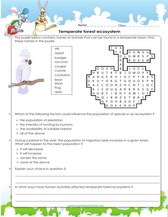Eco Games
Eco games - Our world, it seems, is increasingly facing the threat of industrial human civilization. Our streams and rivers are becoming polluted which is in turn affecting eco-systems worldwide, and between the destruction of habitats caused by our energy consumption and the imminent dangers of global-warming, the outlook seems grim. This is the world which our children will inherit from us, whether we like it or not. One answer to this quandary is to educate our children (and ourselves) about the challenges that we face in these coming years. But how to do it? There is an unlikely, but growing movement within the table-top games industry to try and help.
Board Games on the Table
Long have board-games interacted with the idea of land-usage, such as in the world-famous record-setting
Settlers of Catan
, and the similarly successful
Carcasonne
, so it seems like a natural progression for board games to expand into the ecological sphere. One of the best examples of this fusion of board-game savvy with serious ecological theory is Evolution (2014), which incorporates some typical card-strategy with an understanding that ecosystems require diversity and dynamism to keep going. With over 4,000 different paths for evolving, there is tons of replay value and expansion packs are on the way!
For those who like table-top RPG’s like Dungeons and Dragons, Tales From the Wood is a child-friendly role-playing game in which players assume the roles of woodland creatures, whose lives are being impinged upon by humans. This one seems particularly useful for parents who are looking to teach their kids about the impact humans have on the environment. It’s also worth mentioning that it’s totally free!
I couldn’t go through this article without mentioning the blockbuster board-game hit, Pandemic. While not necessarily about the environment per sé , this game explored many ecological concepts around disease spreading and management and is a great way to introduce people to some of the ideas around man’s interaction with nature. As well as this, it’s won many awards and is a whole bunch of fun.
Digital Evolution
Even beyond the table-top, games like Spore, which was released years ago, teach the importance of ecology and natural evolution bring ecology to the computer. Newer games - like
ECO
from
Strange Loop Games -
help kids and adults alike learn about the effects that human societies have on eco-systems. Using evidence based models, ECO illustrates clearly the terrifying damage that industry and pollution can have on the world. The aim of the game is to save the world from an approaching asteroid, without destroying the very thing you’re trying to save in the process. It’s a clever hook and the reviews are rolling in as overwhelmingly positive, comparing the visual style of ECO to Minecraft. Getting kids and teens involved with these ideas and concept is incredibly important and for there to be appealing games and media to communicate the message is a key step in making visible this most important of issues. In-fact, the US Department of Education provided some funding to assist in the development of ECO, which shows an impetus to change from above. We can only hope against hope that a Trump administration will continue to do the same.




